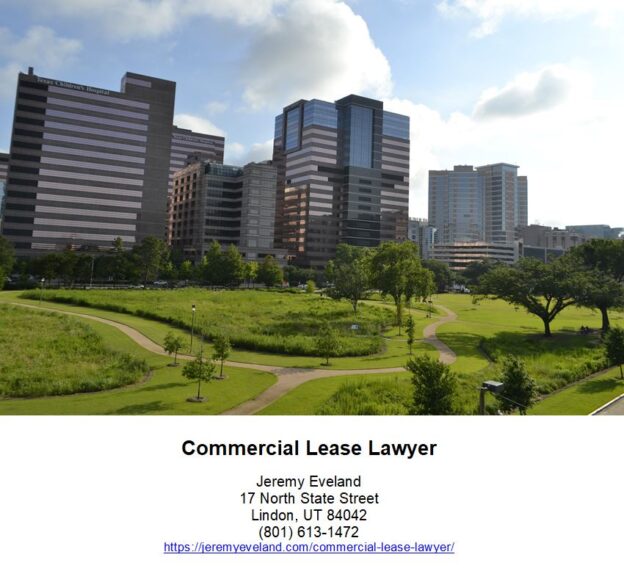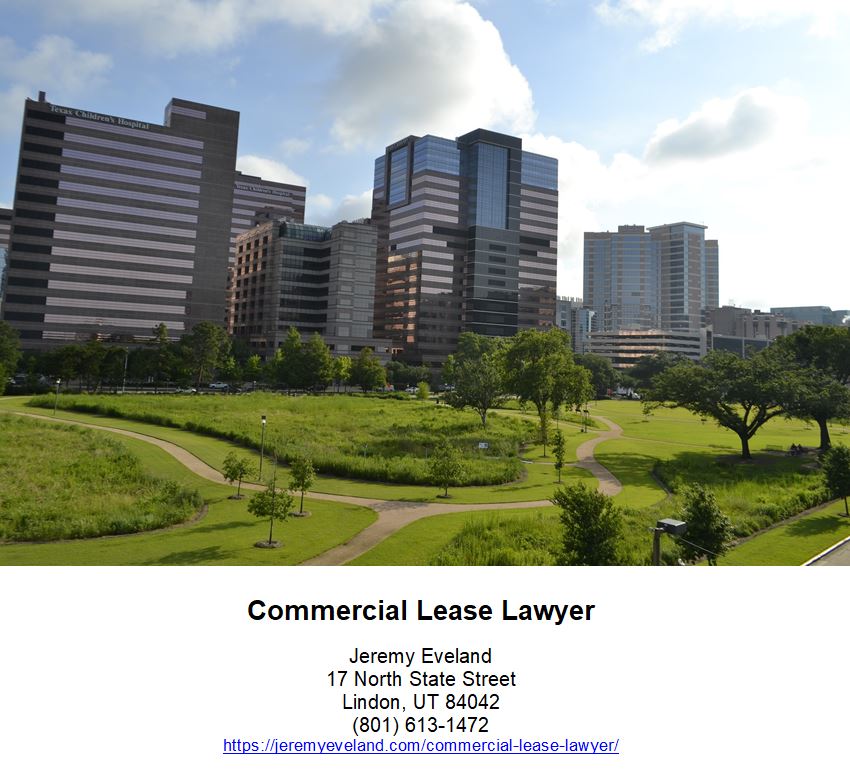Are you a commercial real estate tenant in Utah? If so, understanding the legal guidelines for tenant improvements in commercial leases is crucial. In this article, we will delve into the important details surrounding tenant improvements in Utah, ensuring you have all the information you need to make informed decisions about your space. From necessary permits to construction requirements, we will cover it all. So whether you’re planning on renovating your current space or considering a new lease, read on to ensure you are up to date and confident in navigating the legal landscape of tenant improvements in Utah.
1. Understanding Tenant Improvements
1.1 Definition of Tenant Improvements
Tenant improvements, also known as leasehold improvements, refer to any alterations, additions, or modifications made to a commercial property by a tenant. These improvements are typically undertaken to meet the specific needs and requirements of the tenant’s business operations. Examples of tenant improvements include interior renovations, installation or modification of fixtures, and upgrading of building systems.
1.2 Importance of Tenant Improvements in Commercial Leases
Tenant improvements play a crucial role in commercial leases as they allow tenants to customize their space to suit their business needs. By making these improvements, tenants can create a more functional and attractive environment for their employees and customers. Additionally, tenant improvements often enhance the value of the property, making it more desirable for future tenants. Landlords also recognize the importance of tenant improvements in attracting and retaining high-quality tenants.
1.3 Legal Considerations for Tenant Improvements
It is essential for both landlords and tenants to be aware of the legal considerations associated with tenant improvements. These considerations include compliance with building codes and regulations, obtaining necessary permits and approvals, and allocating costs and responsibilities. Additionally, understanding the rights and obligations of both parties regarding maintenance, repairs, and disputes related to tenant improvements is crucial in order to avoid potential conflicts and legal issues.
2. General Legal Framework
2.1 Overview of Utah Commercial Lease Laws
Before delving into the specifics of tenant improvements, it is important to have a general understanding of the legal framework governing commercial leases in Utah. Commercial leases in Utah are subject to various laws and regulations, including the Utah Code and the Utah Uniform Commercial Code. These laws govern different aspects of commercial leases, such as lease formation, obligations, and termination.
2.2 Key Statutes and Regulations Affecting Tenant Improvements
Several key statutes and regulations in Utah directly affect tenant improvements in commercial leases. These include the Utah Uniform Building Standards Act, which sets forth the building codes that must be followed when undertaking tenant improvements. It is crucial for both tenants and landlords to be familiar with these statutes and regulations to ensure compliance and avoid potential legal issues.
2.3 Role of Lease Agreements in Defining Tenant Improvement Rights
Lease agreements are vital in defining the rights and obligations of both tenants and landlords regarding tenant improvements. These agreements typically include provisions that outline the scope of permitted tenant improvements, the process for obtaining approvals and permits, and the allocation of costs and responsibilities. Clear and comprehensive lease agreements can help prevent misunderstandings and disputes related to tenant improvements.

3. Tenant Improvement Allowance
3.1 Understanding Tenant Improvement Allowance
Tenant improvement allowance refers to the financial contribution provided by the landlord to the tenant to cover the costs of tenant improvements. This allowance can be a fixed dollar amount or a percentage of the total project cost. The tenant improvement allowance is negotiated between the landlord and the tenant and is typically included as a provision in the lease agreement.
3.2 Negotiating Tenant Improvement Allowance
When negotiating the tenant improvement allowance, it is important for tenants to thoroughly assess their needs and carefully estimate the costs of the improvements. Tenants should consider factors such as the scope of the project, the market rates for similar improvements, and the financial capabilities of the landlord. Skillful negotiation can result in a fair and beneficial tenant improvement allowance that adequately meets the tenant’s requirements.
3.3 Legal Considerations in Tenant Improvement Allowance
From a legal perspective, it is crucial for both tenants and landlords to clearly define the terms and conditions of the tenant improvement allowance in the lease agreement. This includes specifying the permitted uses of the allowance, the documentation required for reimbursement, and any limitations or restrictions on the use of the allowance. A well-drafted lease agreement will help avoid any confusion or disputes regarding the tenant improvement allowance.
4. Permissible Tenant Improvements
4.1 Types of Permissible Tenant Improvements
The types of tenant improvements that are permissible will depend on various factors, including local building codes, the property’s existing infrastructure, and any restrictions imposed by the landlord. Permissible tenant improvements can range from minor cosmetic changes, such as painting or flooring upgrades, to major structural alterations, such as the installation of partitions or the addition of HVAC systems. It is essential for tenants to obtain the necessary approvals and permits for these improvements to ensure compliance with applicable regulations.
4.2 Obtaining Approvals and Permits for Tenant Improvements
Before commencing any tenant improvements, tenants must obtain the required approvals and permits from the appropriate authorities. This typically involves submitting detailed plans and specifications to the local building department and obtaining their review and approval. Tenants may also need to obtain permits for specific aspects of the improvement project, such as electrical or plumbing work. It is crucial to follow the proper procedures and meet all necessary requirements to avoid any legal complications.
4.3 Compliance with Building Codes and Regulations
Compliance with building codes and regulations is paramount when undertaking tenant improvements. These codes and regulations are in place to ensure the safety, accessibility, and sustainability of commercial properties. Failure to comply with these requirements can result in fines, penalties, or even the need to undo the improvements. Tenants should work closely with qualified professionals, such as architects and contractors, to ensure that all tenant improvements meet the necessary standards and regulations.

5. Tenant Improvement Responsibility
5.1 Allocation of Tenant Improvement Costs and Expenses
The allocation of tenant improvement costs and expenses is typically addressed in the lease agreement. The lease agreement will outline the respective responsibilities of the tenant and the landlord for funding the improvements. Depending on the negotiation, the tenant may be responsible for all costs, the landlord may offer a tenant improvement allowance, or the parties may agree to share the costs. It is crucial for tenants to carefully review and understand these provisions to avoid any financial surprises.
5.2 Maintenance and Repairs for Tenant Improvements
The maintenance and repair responsibilities for tenant improvements can vary depending on the lease agreement. In some cases, the tenant may be responsible for maintaining and repairing the improvements throughout the lease term. Alternatively, the landlord may assume responsibility for certain aspects or may require the tenant to return the premises to its original condition upon lease termination. Tenants should be aware of their maintenance and repair obligations to ensure proper upkeep of the improvements.
5.3 Rights and Obligations of Landlords and Tenants
Both landlords and tenants have certain rights and obligations when it comes to tenant improvements. Landlords have the right to approve or reject proposed improvements, enforce building code compliance, and ensure that improvements do not affect the structural integrity of the property. Tenants, on the other hand, have the right to make improvements that enhance the functionality and attractiveness of their space. Understanding these rights and obligations is crucial for maintaining a positive landlord-tenant relationship.
6. Disputes and Resolutions
6.1 Common Disputes Regarding Tenant Improvements
Disputes related to tenant improvements can arise in various circumstances. Common disputes include disagreements over the scope or quality of the improvements, issues with obtaining necessary permits or approvals, and disputes over the allocation of costs. It is important for both landlords and tenants to have a clear understanding of their rights and responsibilities outlined in the lease agreement to help prevent and resolve these disputes efficiently.
6.2 Mediation, Arbitration, and Litigation Options
When disputes related to tenant improvements cannot be resolved through negotiation or informal discussions, alternative dispute resolution methods such as mediation or arbitration may be pursued. Mediation involves the parties engaging in facilitated negotiations with the assistance of a neutral third party. Arbitration involves presenting the dispute to a neutral arbitrator who will make a binding decision. If these methods are unsuccessful or not chosen, litigation may be necessary to resolve the dispute through the court system.
6.3 Seeking Legal Counsel for Tenant Improvement Disputes
Tenant improvement disputes can be complex, time-consuming, and costly to resolve. It is advisable for both landlords and tenants facing such disputes to seek the guidance of an experienced commercial real estate lawyer. A knowledgeable lawyer can provide valuable advice, negotiate on behalf of their client, and represent them in mediation, arbitration, or litigation if necessary. Seeking legal counsel early in the process can help mitigate potential disputes and protect the rights and interests of all parties involved.
7. Lease Renewal and Tenant Improvements
7.1 Impact of Lease Renewal on Tenant Improvements
Lease renewal can have implications for existing tenant improvements. In some cases, lease renewal may require the tenant to remove or undo certain improvements as part of the lease termination obligations. Tenants should carefully review the lease agreement provisions regarding lease renewal and understand the potential impact on their improvements.
7.2 Renegotiating Tenant Improvements during Lease Renewal
When negotiating a lease renewal, tenants may have the opportunity to discuss and renegotiate their tenant improvements. This can involve expanding or altering existing improvements to meet changing business needs or negotiating for additional tenant improvement allowances. It is important for tenants to assess their current and future requirements and communicate them effectively during the lease renewal process.
7.3 Ensuring Preservation of Tenant Improvement Rights
During lease renewal, it is crucial for tenants to ensure the preservation of their tenant improvement rights. This includes reviewing the lease agreement provisions related to tenant improvements and confirming that they adequately protect the tenant’s rights and interests. Consulting with a commercial real estate lawyer can help tenants navigate this process and effectively negotiate the preservation of their tenant improvement rights.
8. Lease Termination and Tenant Improvements
8.1 Responsibility for Tenant Improvements upon Lease Termination
When a lease reaches its termination, the responsibility for tenant improvements depends on the lease agreement terms. Some lease agreements may require the tenant to remove all improvements and restore the premises to its original condition, while others may allow the tenant to leave the improvements in place. It is vital for both tenants and landlords to carefully review the lease agreement provisions regarding the responsibility for tenant improvements upon lease termination to avoid any misunderstandings or disputes.
8.2 Options for Removal or Retention of Tenant Improvements
Depending on the lease agreement and local regulations, tenants may have the option to remove or retain their improvements upon lease termination. If removal is required, tenants must ensure that they adhere to local building codes and regulations. If retention is allowed, tenants should make arrangements with the landlord to address any potential concerns or future maintenance obligations.
8.3 Legal Considerations during Lease Termination
During lease termination, tenants and landlords must be mindful of their legal obligations and responsibilities regarding tenant improvements. This includes ensuring compliance with any obligations related to the removal, restoration, or retention of improvements, as well as settling any financial matters such as unpaid improvement costs or the return of the tenant improvement allowance. Seeking legal counsel can help both parties navigate this complex process and ensure a smooth transition.

9. Navigating Tenant Improvement Clauses
9.1 Understanding and Analyzing Tenant Improvement Clauses
Tenant improvement clauses are provisions in the lease agreement that outline the specific terms and conditions related to tenant improvements. These clauses can cover various aspects, including the scope of permissible improvements, approval procedures, cost allocation, and maintenance responsibilities. It is crucial for tenants to thoroughly understand and analyze these clauses to ensure that they align with their business needs and protect their rights and interests.
9.2 Evaluating Tenant Improvement Allowance and Cap
When evaluating tenant improvement clauses, tenants should pay close attention to the tenant improvement allowance and any cap or limitation on reimbursement. The tenant improvement allowance should be sufficient to cover the projected costs of the improvements, while the cap prevents unexpected expenses beyond a certain limit. Tenants should carefully evaluate these provisions and consider seeking legal advice to ensure that they are fair and favorable.
9.3 Modifying Tenant Improvement Clauses to Protect Tenant Rights
In some cases, tenants may find it necessary to negotiate and modify tenant improvement clauses to better protect their rights and interests. This may include expanding the scope of permissible improvements, adjusting the tenant improvement allowance, or clarifying the approval process. Seeking the assistance of a skilled commercial real estate lawyer can greatly aid tenants in negotiating favorable modifications to tenant improvement clauses.
10. Conclusion
Tenant improvements are an integral part of commercial leases, allowing tenants to create a customized space that meets their unique needs and enhances their business operations. Understanding the legal considerations surrounding tenant improvements is crucial for both landlords and tenants to navigate the complexities of commercial leasing successfully. By adhering to the legal guidelines, negotiating favorable lease terms, and seeking legal advice when needed, landlords and tenants can ensure that their tenant improvement projects are carried out smoothly and in accordance with the law.































